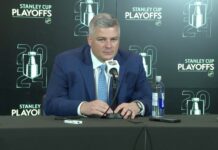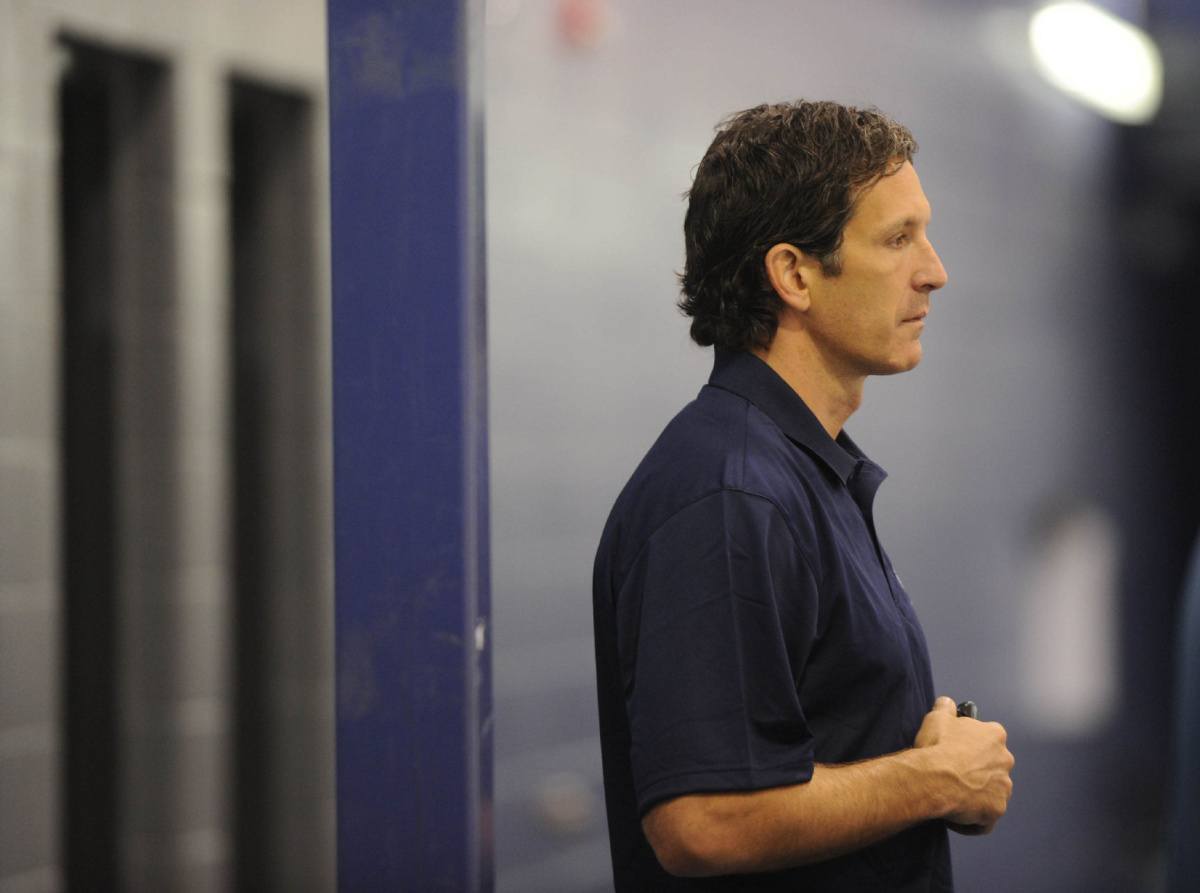In his end-of-season media availability, Toronto Maple Leafs President Brendan Shanahan discussed his continued faith in Kyle Dubas’ vision and where the team needs to improve in order to get over the hump at playoff time.
Two years ago, you made a commitment to Kyle Dubas as GM and asked Lou Lamoriello to step aside as his contract was designated. In the two years since you have added John Tavares and Jake Muzzin, and the team has gotten worse. How do you explain these two seasons?
Shanahan: I think we certainly acknowledge — and we talked about this just about an hour ago — that we have in some ways taken a step back, but we are really determined in spite of that. We think there is an opportunity to take more steps forward.
First off, I want to say that I have complete faith in Kyle as a General Manager, in Sheldon as a coach, and complete confidence in what we are going to do here in Toronto.
Obviously, I am not going to talk about other people that are with other teams, but I am going to talk about the direction we are going now. It is a difficult thing to talk about when you are two days removed from losing, but I think our potential and our potential for growth is even greater than a couple of years ago.
I am confident we are going to get it done. I am absolutely confident that we are going to be determined to get it done. We just have to go to work. On days like today, you’ve got to face the music, and it is not pleasant. We will not be the only team doing this. Every team other than the one team that wins the Stanley Cup will be having these same questions and talking about next year and what changes can be made. We have identified and have seen some of the things that are deficient in our group. We have been around long enough now where we have seen them, and we want to make those improvements.
Again, it is not time to feel sorry for yourself. It is time to get back to work. I have a lot of faith in Kyle as a GM and Sheldon as a coach, in our ownership group and the support they give us, and the fans — they’re frustrated. I mean, it has been four years in a row now that we have gone out in the first round. For our fans in Toronto, though, it has been 16 years since they have won a round and it has been 53 years since we won a Cup. You inherit a little bit of history here, so you have to be understanding of a fan base that is excited and wants to be rewarded and get results.
This is a results business. We are determined to get those results.
People in the media will say things like, “This team needs its Steve Yzerman moment” — the very famous moment where Scotty Bowman talked Steve Yzerman into worrying about defense more than offense. Do you agree with that? Do you think your guys are on their way?
Shanahan: I can say that has been a focus of the communication from Sheldon to our players and our players understand that. Even though we didn’t score in this series, we are confident, when we look at our roster, with our ability to score.
If you want to become an elite team in the NHL, it’s pretty consistent that the teams that actually go all the way and win are teams that know how to defend. If you look at some of the recent Stanley Cup winners, they also have very successful offensive players. It doesn’t necessarily detract from your offense.
I saw it even in this series. There were moments where our team did it excellently. I just think it is about that consistency of doing it all the time and not putting yourself in a position where you are always playing catch-up and not always putting yourself in a position where you are always having to play a do-or-die game. It is taking care of business early.
Getting comfortable and consistent with that throughout the season is really important. That is certainly going to be a focus of ours, whether it is through our mindset or through personnel. We have to become a team that decides to be very, very good defensively as a six-man unit out on the ice.
We are not being outclassed in these playoffs. We are not going to the playoffs and running into teams and saying, “Wow, we are miles away.” That being said, we are not getting over that final hurdle. We have to do that. We think that really becoming a much better, consistent team defensively will be very helpful in that regard.
How much can a player alter your evaluation of him for better or worse based on a five-game series? Is it too small of a sample size, or is it telling because of the spotlight?
Shanahan: I guess if you took a step back and said, “Is it too small of a sample size?” you might say yes, but the reality is, that’s sports. That is how it works. Somebody has a good week and people are pleased. If someone has a bad week, they have a tough time. It is just the reality of how it goes. If we win Game 5, we are in a different spot, but we don’t.
You go through this and you certainly try to make improvements and try to address things you feel the need to address, but you also have to have perspective. Again, like we’ve talked about, words are not going to fix this. Us talking here today, we understand the importance of it and that people want to hear from us, but the things we say today are not what is going to get this thing done. It is going to be the work that we do from now to the start of next season, and especially the work — as Sheldon alluded to — that we do on the ice in the season as we get ready to go after this again.
Whether it is too short of a time or not, it really doesn’t matter. That is just sports. You do your best to get the job done. I’ll say this, too: I really thought that our players competed in many ways in this series. You are not always going to win every shift. You are not going to win every game. It didn’t go our way, and there were things we could’ve and should’ve done better. Looking specifically at that moment in Game 3 where we were up 3-0 and had all the momentum, it was a real key moment in this series for all of us looking back. At the end of the day, there was a lot of good things and growth that we saw from some of our most important players in the way that they competed even though it didn’t go the way that we wanted to.
What went right, what went wrong, and what changes need to be made so that you can come back at it and go after again — that is obviously going to be a real focus of ours. We really feel that this is not something we can let discourage us. We can allow this to make our players and our staff more determined and more mentally tough — to take a bad situation and growth from it rather than let it make us smaller and more defeated. I think that the focus right now is on how we get better and what changes we have to make.
When you look at the heights the team did achieve for months or weeks, and then the games where it didn’t happen — in the playoffs and regular season — how much stock can you put into the heights that this team can get to? How much do you put into the stuff that kept this team from being a team that was automatically in the playoffs, a team that lost in the five-game qualifying series?
Shanahan: To add to what Kyle said, different than past years as this team has sort of been coming together, I sense that the players are extremely angry — angry at themselves. We’re angry with ourselves. They have higher expectations. These guys really want to win. They really want to become the team that we are capable of becoming. I really believe that about them. They are not making excuses.
We will all look for solutions, but this is not a team that is making excuses right now. The blame lies on us. It is not a time in our development where we are pointing the blame at anyone else. This is on us. The solution is also within us.
Not that any team is going play 82 regular-season games without a bad spell or a bad game or without a bad moment, but we have to really come back and find that game that we see us do when it seems our backs are against the wall — with that great attention to detail against elite teams; still offensive, but very good and disciplined defensively. We have to find a way to have that game more consistently. Part of growing up in the NHL is doing something consistently.
The players will just call it being a professional. Our guys want to get there. They know they have to do that more consistently in the regular season so that when you do get in the playoffs, first off, you don’t put yourself in a position that each and every year you are facing an elimination game. In the last years, there has been Game 7, Game 7, and Game 5. You want to show up on time and you want to put teams away. When you have them down, you have to not let them get up and not give them an opportunity. That is a maturity and that is a team growing up.
Our team wants to do that. It needs to do that. It starts in the regular season so that when you get to the playoffs, you are not uncomfortable playing with the lead or you’re not uncomfortable playing that disciplined style of hockey. That is what Kyle and Sheldon and I are talking about right now. It has to do with a mindset. It has to do with some personnel issues. But I can tell you that there are no excuses being made here. No one is feeling sorry for ourselves, either. It is really about finding solutions so that we get over that hump. We really do believe this group will.
There are going to be changes every year, but we really do believe that the core guys certainly want to make those changes and get over that hump. We understand why Toronto fans are frustrated. They are entitled to be. They should be. Our players really do want to perform for them and themselves.
You mentioned back when the coaching change was made that toughness is defined differently these days. Do you see enough of it in the current roster or have a belief that they are going to mature and be at that point? Or do you have to help them out by adding?
Shanahan: I think a bit of both. I will let Kyle and Sheldon speak to this a little bit here. We all talk about it. It is a bit of both. It is a bit of people growing into it. I do believe you can develop grit. I know a lot of players in modern history, and you can even go back decades, that were accused of not being winners or being too soft to win and suddenly won. They changed the narrative of themselves.
That is not something new in sports in general. You have to win to change the narrative about who you are as an athlete. That is not something new and it is not unique to Toronto. That being said, I do think that can be developed. I do think players can change how they are perceived. I also think that compete level and grit are areas that we might need to help our team a little bit with.
End of Season Interviews
- Kyle Dubas
- Sheldon Keefe
- Morgan Rielly
- Auston Matthews
- John Tavares
- Mitch Marner
- Frederik Andersen
- William Nylander
- Tyson Barrie
- Jake Muzzin
- Jason Spezza
- Zach Hyman


![Jim Montgomery Post Game, Bruins 4 vs. Leafs 2: “[Marchand] still manages to get under people’s skin, yet he doesn’t cross the line” Jim Montgomery, Boston Bruins post game](https://mapleleafshotstove.com/wp-content/uploads/2024/04/jim-monty-pg-to-218x150.jpg)
























![Jim Montgomery Post Game, Bruins 4 vs. Leafs 2: “[Marchand] still manages to get under people’s skin, yet he doesn’t cross the line” Jim Montgomery, Boston Bruins post game](https://mapleleafshotstove.com/wp-content/uploads/2024/04/jim-monty-pg-to-100x70.jpg)







